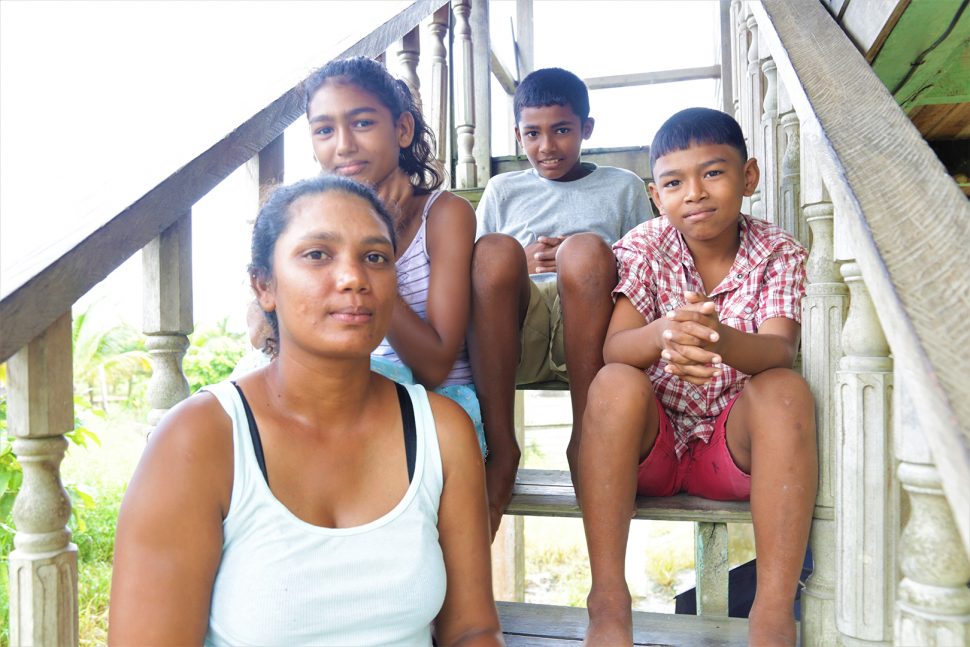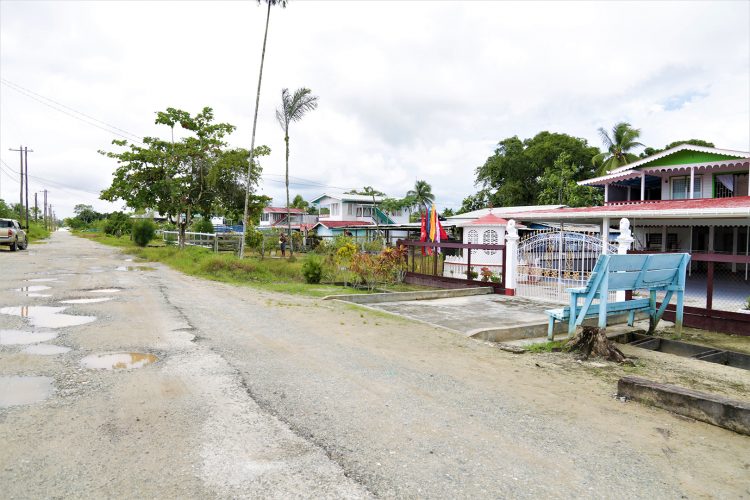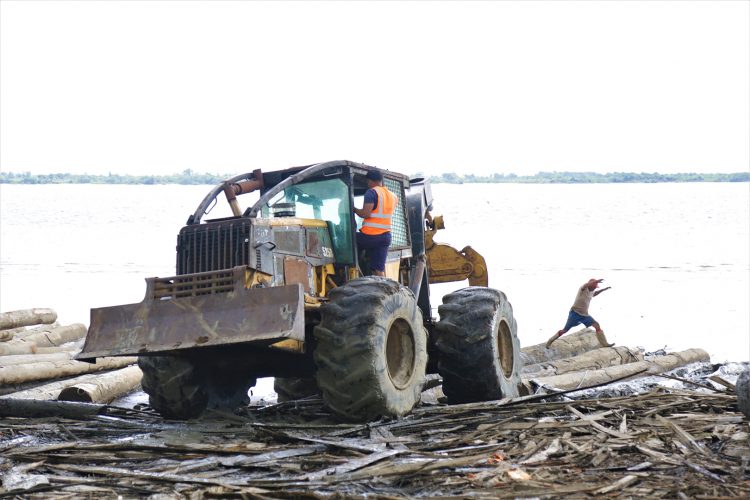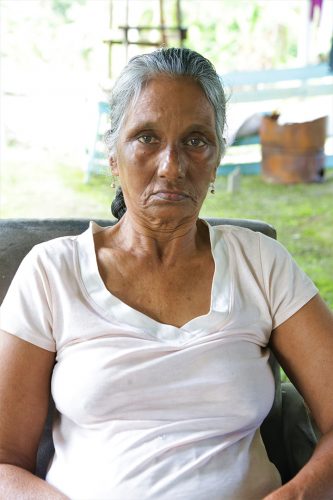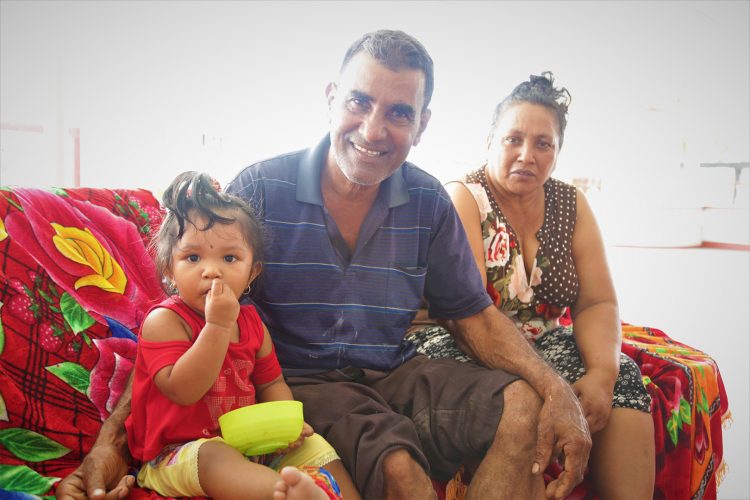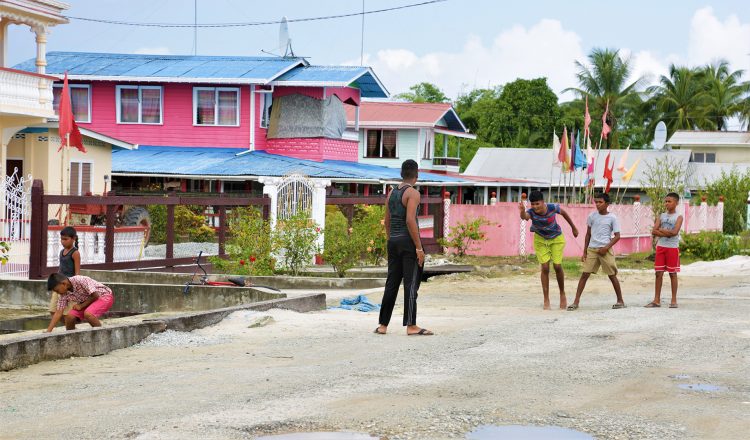Fourteen years ago, when Naline Singh got married she left the busy village of Goed Fortuin to live in the quiet countryside village where her husband grew up.
Lookabu is an Essequibo farming village behind Parika, bordered by Present Hope and Naamless. It has a population of approximately 100, the majority of whom till their own farms, work as labourers on other farms or sell crops produced in the village.
The eastern side of the village is farmland and to the west is the river and Hog Island, which is situated opposite; to the north west is Fort Island, in the middle of the Essequibo River, and just a 10-minute boat ride away.
It was a rainy day for the most part when I visited, although the sun peeked through the grey clouds and intermittent drizzle. It was Emancipation Day and the market was closed. While a few farmers remained at home, many were in the backdams. Children were scattered around the community, mostly playing. Some amused themselves with a game of marbles, which they called “pools”; the older ones were playing together, while the younger imitated the game nearby.
Lookabu had seemed dull to Naline when she moved. It was a place where people worked harder for the necessities of life. There was no electricity or potable water and she had to adjust. By and by she learned to manage the kerosene lamp and to conserve water as they depended mainly on the rain. Her closest neighbours were several weed-filled, bushy lots away. Some years ago, the village finally got electricity, potable water, telephones and a road which is today riddled with potholes. Its deteriorated state has led those who traverse it to nickname it ‘Abortion Road’ as they claim it can cause pregnant women to lose their babies. There is no evidence to support this claim of course. The few buses that ply the route take more than an hour to fill up at the Parika Market and charge $200 per person. Taxis charge between $1,500 and $2,000.
Naline sells with her husband at the Vreed-en-Hoop Market. They have been doing so for five years. They buy produce from farmers in the village and from wholesalers at the Stabroek Market. Some days, the couple would leave home at 2 am using a vehicle that usually picks up vendors since their Canter is not working. They would offload whatever produce they have at Vreed-en-Hoop then head to Georgetown to purchase more goods, before getting back to their stall. Vending begins at 8 am and it takes that long for them to get everything set up.
With school out, their children accompany them, waking up in the wee hours of the morning and returning home at night. Two of the three children are at high school; one attends Parika Secondary and the other Leonora Secondary. The youngest, a three-year-old, will attend St Lawrence Nursery School come September.
Rukmin Singh hails from Bee Hive, East Coast Demerara. She also moved to Lookabu when she got married; she was 16 years old. There were rarely any cars in those days, but Rukmin’s uncle had one and he drove her to Lookabu for her wedding day. On the second Sunday, when it was time for her to return to her husband’s home, she walked a great deal in before she was picked up by a jeep. Rukmin recalled that at one time, there was just a single hire car plying the Parika to Lookabu route. The driver’s name was Doobay. On many occasions she walked the 13-plus miles to Parika. It took a very long time, she recalled. There was a time, she said, that the road got so bad near Hubu Village that the potholes became ponds and drivers refused to venture further, forcing persons to walk. In her case, she walked from Hubu, through St Lawrence and Present Hope. Later, a few of the men in the village came together and cut down coconut trees which were thrown across the ponds of water to make getting pass them easier.
Rukmin spent decades farming with her husband until he got sick. By then her children were grown, she said. Today her son and his family live with her. A normal day finds her relaxing and chatting with her daughter-in-law most of the time. With most of her eyesight gone, she is unable to be entertained by the television or the newspaper, but she gets the news from her family. Today too, she mostly hears about the condition of the road as she rarely ventures out.
The road is the biggest problem, she said, and she hopes that it can soon be rehabilitated to allow villagers to get in and out of Lookabu with ease.
Ratiebhaan Singh, 57, is a native of Lookabu. He said the village was owned by his grandfather, passed down to his father and uncles, and now to him and his brother and their sons.
Ratiebhaan attended St Lawrence School as a boy. Before he left for school in the morning, he was required to milk the cows and take them out to graze. When he returned home, he had to round them up and take them back in. His family had 18 cows along with a herd of sheep; they also planted rice, sugarcane, plantain, cassava and other cash crops.
Ratiebhaan left school at the age of 12 and began farming full time with his parents. Today he still farms. He and his wife, Indranie, who sat nearby listening, sell at the Hydronie Market. Hydronie is the village before Parika. They sell wholesale at the market on Saturdays and retail on Sundays.
Behind Ratiebhaan I could see pods of bora (long beans) drying on the concrete in the sun. After they are dried, Ratiebhaan removes the beans and plants them.
“Abee get light, water and road in 2009/2010. Nobody ain’t deh fuh upkeep the road. When it get wan hole, it turn worse and worse and worse until it turn big. Abee road ah major problem,” he said. The man boasted that farmers from Lookabu are doing a great deal toward providing Guyana with food and it was time they had proper infrastructure.
To get to his farm, Ratiebhaan travels some distance in a tractor-trailer then takes a boat for another hour and a half. But the four-foot trench is shallow now, he said, and this disrupts him during his journey to and from his farm. The build-up of silt in the trench has already damaged his propellers, putting him in expense. He requested that the canals be dug to allow farmers to easily access their farms.
“This area is not NDC area. We are out of local authority territory. Fuh abee get this road we had to keep meeting before they do something. They say we can’t get a proper road because we not with the NDC. I really want them do this road and give we some streetlights,” he added.
On my way out of Lookabu I stopped at the sawmill. Most of the workers were on their lunch break, but a few continued working. Dwayne Mangal was in charge. This is a family business registered under the Krishna Mangal and Sons Sawmills. They also have a second business, Builders Choice Lumberyard, located in Tuschen. Mangal took time out from his schedule to show me around. He pointed out the Warishi log explaining that it was the largest of logs he had at the sawmill. After being cut to size, Warishi logs are exported to countries like Jamaica and Japan, where they are dressed, or machine finished for a smoother surface.
